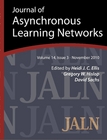Leaner Support Requirements for Online Workplace Training in the South African Furniture Industry
DOI:
https://doi.org/10.24059/olj.v14i3.80Keywords:
E-learning, learner support, workplace learners, corporate training, online training.Abstract
In 2005, a qualitative research project was conducted to evaluate the suitability of e-learning as a means of delivering training to workplace learners in the South African furniture manufacturing sector. Twenty learners participated in a three-month pilot e-learning course and were monitored throughout. While the study was designed primarily to investigate the effectiveness of various pedagogical techniques in a South African context, the importance of providing adequate support to learners emerged as a critical theme during the research project, and this is the subject of this article. Issues included: poor awareness among learners’ superiors, IT staff, and financial managers about the e-learning activities that their employees were involved in; sensitivity about costs incurred by employees in connecting to the Internet; a ‘hands-off’ attitude to online training by human resources staff; and a failure in many cases to set aside adequate study hours for employees. Recommendations for companies undertaking training via e-learning include: performing a cost-benefit analysis of face-to-face versus online training; facilitating clear and timely communication within the organisation regarding e-learning activities; and establishing a study plan for each learner with the active involvement of learners’ supervisors, IT support specialists, human resources staff, and financial managers.Published
2010-11-20
Issue
Section
Innovations in Online and Blended Education in Community Colleges
License
As a condition of publication, the author agrees to apply the Creative Commons – Attribution International 4.0 (CC-BY) License to OLJ articles. See: https://creativecommons.org/licenses/by/4.0/.
This licence allows anyone to reproduce OLJ articles at no cost and without further permission as long as they attribute the author and the journal. This permission includes printing, sharing and other forms of distribution.
Author(s) hold copyright in their work, and retain publishing rights without restrictions






